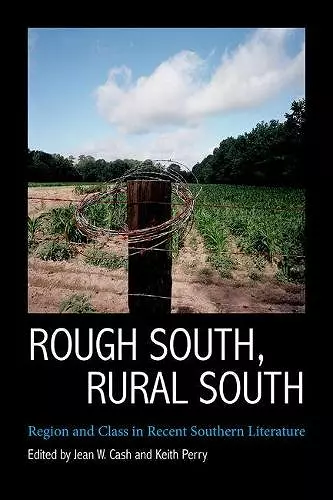Rough South, Rural South
Region and Class in Recent Southern Literature
Keith Perry editor Jean W Cash editor
Format:Paperback
Publisher:University Press of Mississippi
Published:28th Feb '17
Currently unavailable, and unfortunately no date known when it will be back

Essays in Rough South, Rural South describe and discuss the work of southern writers who began their careers in the late twentieth and early twenty-first centuries. They fall into two categories. Some, born into the working class, strove to become writers and learned without benefit of higher education, such writers as Larry Brown and William Gay. Others came from lower- or middle-class backgrounds and became writers through practice and education: Dorothy Allison, Tom Franklin, Tim Gautreaux, Clyde Edgerton, Kaye Gibbons, Silas House, Jill McCorkle, Chris Offutt, Ron Rash, Lee Smith, Brad Watson, Daniel Woodrell, and Steve Yarbrough. Their twenty-first-century colleagues are Wiley Cash, Peter Farris, Skip Horack, Michael Farris Smith, Barb Johnson, and Jesmyn Ward.
In his seminal article, Erik Bledsoe distinguishes Rough South writers from such writers as William Faulkner and Erskine Caldwell. Younger writers who followed Harry Crews were born into and write about the Rough South. These writers undercut stereotypes, forcing readers to see the working poor differently.
The next pieces begin with those on Crews and Cormac McCarthy, major influences on an entire generation. Later essays address members of both groups - the self-educated and the college-educated. Both groups share a clear understanding of the value of working-class southerners. Nearly all of the writers hold a reverence for the South's landscape and its inhabitants as well as an affinity for realistic depictions of setting and characters.
Rough South, Rural South surveys a vibrant cultural scene centered on the traditionally marginalized matter of social class in the far reaches of the US South. The impressive essays in this collection call attention to contemporary writers and filmmakers who take different paths to reach the common ground of depicting hardscrabble places and people with a gritty, imaginative vision that eschews caricature in favor of complexity. There is a necessary roughness at work here - a forceful critical engagement with the harsh realities and difficult questions that the artists under examination lay bare."" - Ted Atkinson, editor of Mississippi Quarterly and author of Faulkner and the Great Depression: Aesthetics, Ideology, and Cultural Politics
ISBN: 9781496810526
Dimensions: unknown
Weight: 365g
264 pages